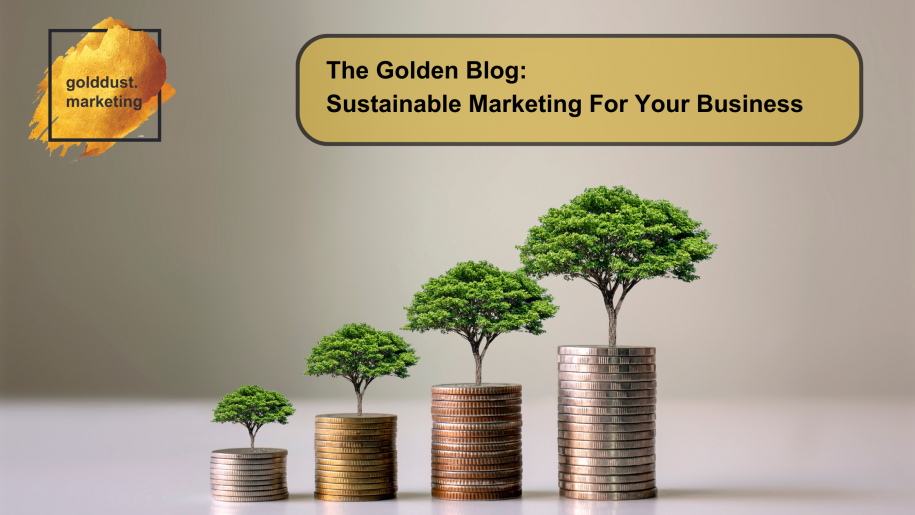Driving Positive Change
In recent years, sustainability has become a key driving
force in business practices, and for a good reason. As we navigate the
challenges of the 21st century, the importance of adopting sustainable
practices cannot be overstated. Businesses have a unique opportunity to
contribute to a greener and more environmentally conscious future through
sustainable marketing efforts.
In this blog, we will explore why sustainability matters for your
business and provide valuable tips on sustainable marketing practices to help
them make a positive impact on both their bottom line and the planet.
Why Does Sustainability Matter?
Sustainability is not just a buzzword; it’s a fundamental
shift in how we do business. As consumers become more socially and environmentally
aware, they are increasingly seeking out products and services from companies
that align with their values. Here are some reasons why sustainability matters
for your business:
1. Meeting Consumer Expectations: modern consumers are more
informed and conscious about the environmental and social impact of their
purchases. They are actively seeking products and services from businesses that
demonstrate a commitment to sustainability. By embracing sustainable practices,
small businesses can attract and retain eco-conscious customers.
2. Differentiation in the Market: the marketplace can be
highly competitive, especially for small businesses or those in a specific
sector such as social care. Embracing sustainability can be a powerful way to
differentiate your brand from competitors and create a unique selling
proposition that resonates with environmentally conscious customers.
3. Cost Savings and Efficiency: sustainable practices often
lead to cost savings in the long run. For instance, energy-efficient operations
and waste reduction efforts can result in reduced utility bills and waste
disposal costs.
4. Positive Brand Image: a strong commitment to
sustainability can enhance a company’s brand image and reputation. Businesses
that actively contribute to environmental and social causes are more likely to
be perceived as ethical and responsible, fostering goodwill among consumers and
the local community.
5. Future-Proofing the Business: as regulations and societal
expectations shift towards sustainability, businesses that proactively adopt
eco-friendly practices are better prepared for any potential legal or
market-driven changes.
Tips for Sustainable Marketing Practices
Now that we understand why sustainability matters, let’s
explore some practical tips on how your business can embrace sustainable
marketing practices:
1. Define Your Sustainability Goals: start by setting clear
and achievable sustainability goals for your business. These could include
reducing carbon emissions, sourcing eco-friendly materials, supporting local
suppliers, or implementing waste reduction measures. Communicate these goals
transparently with your customers to build trust and credibility.
2. Tell Your Story: consumers love stories that resonate with
their values. Share your sustainability journey with your audience through
various marketing channels. Use your website, social media, and email
newsletters to showcase your eco-friendly initiatives, responsible sourcing,
and community involvement.
3. Green Packaging and Product Design: if your business
involves physical products, consider using eco-friendly and recyclable
packaging materials. Reduce unnecessary packaging and aim for minimal waste in
your product design and manufacturing process.
4. Embrace Digital Marketing: digital marketing is inherently
more sustainable than traditional print marketing. Use email campaigns, social
media advertising, and online content to reach your audience while minimising
paper waste. If you are going to embrace direct marketing, think about the
materials used in your campaigns, and their sustainability.
5. Partner with Sustainable Influencers: collaborate with
influencers or brand ambassadors who are passionate about sustainability.
Partnering with eco-conscious influencers can help expand your reach to a
like-minded audience.
6. Host Sustainable Events: if you host events or workshops,
make them eco-friendly. Choose sustainable venues, use biodegradable materials,
and encourage participants to car share or use public transport.
7. Support Local Causes: get involved in local sustainability
initiatives and community projects. This involvement not only demonstrates your
commitment to the local community but also generates positive PR opportunities.
8. Educate Your Customers: use your marketing channels to
educate your customers about sustainability issues and the importance of making
eco-friendly choices. Encourage them to join you on your sustainability
journey.
9. Measure and Share Your Impact: track your sustainability
efforts and share your progress with your customers regularly. Use key
performance indicators (KPIs) to measure your environmental impact and
highlight your achievements.
Sustainability is no longer an option; it’s a necessity for
businesses seeking long-term success.
By embracing sustainability, telling your story, and actively
engaging with eco-conscious consumers, your business can create a greener, more
responsible future while also benefiting your bottom line. Remember,
sustainability isn’t just about doing the right thing; it’s about building a
better and more prosperous tomorrow for all.
At Golddust Marketing, sustainability is something that we
take very seriously. If you need any help or advice to implement a sustainable
marketing strategy, we’d love to hear from you.

